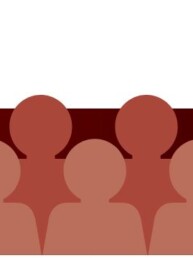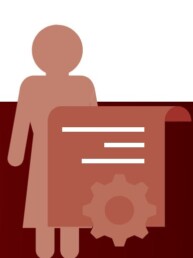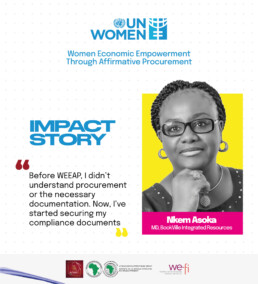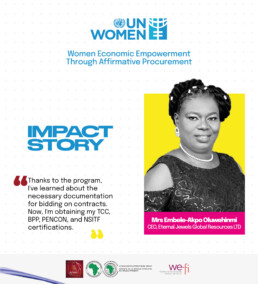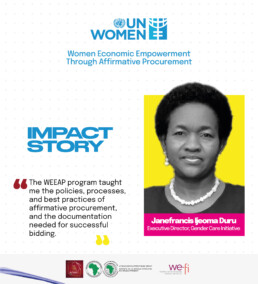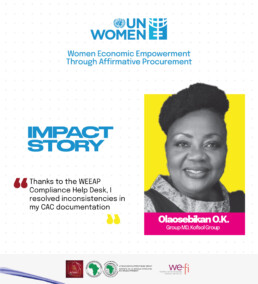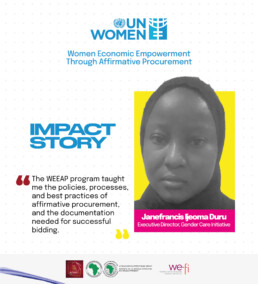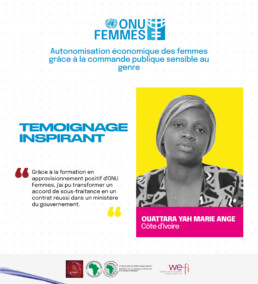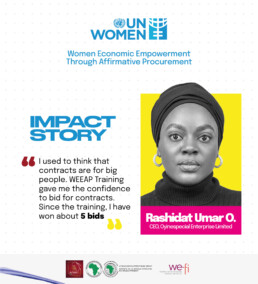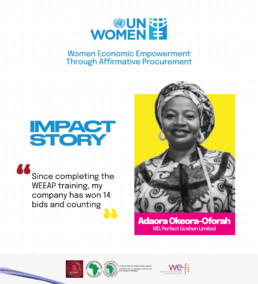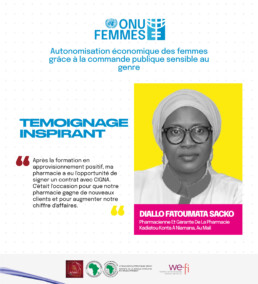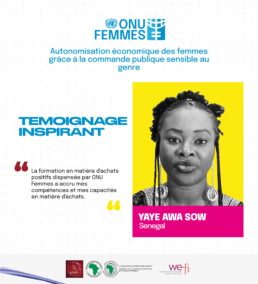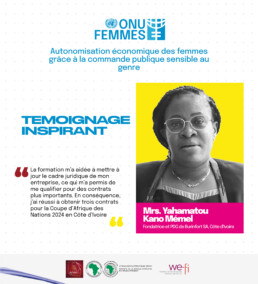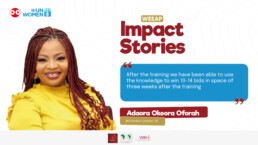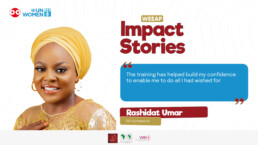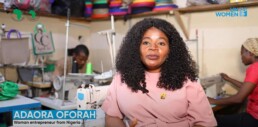About
Gender-responsive procurement is the sustainable selection of services, goods or civil works that consider the impact on gender equality and women’s empowerment. Gender-responsive procurement represents a huge opportunity to build a more inclusive economy, increase the participation of women-owned/-led businesses, and promote gender equality. Promoting supplier diversity and expanded participation of women in procurement processes contributes to expanding women’s economic opportunities and has a direct impact on a country’s ability to achieve SDG5 and meet its commitments under the 2030 Agenda.
The Project Affirmative Procurement Reform in West Africa supports women’s economic empowerment through policy reforms, institutional strengthening of public sector institutions and capacity building of women-owned/-led businesses to access procurement opportunities in Senegal, Nigeria, Cote d’Ivoire and Mali.
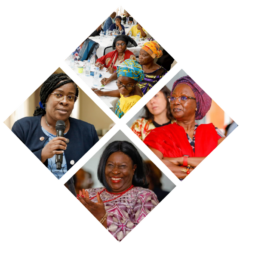
Under component one, affirmative procurement reform in West Africa, the project works to strengthen public policies and private practices and strategies to create an enabling environment for WSMEs to participate and contribute to the economy in Senegal, Nigeria and Mali.
Under component two, gender-responsive procurement in the COVID-19 response and recovery in West Africa, the project supports women-led businesses in the process of pivoting to new business models that leverage technology in the post-COVID-19 environment. Component two is implemented in the four countries.
As part of its goals, the project aims to achieve the following key targets:
- Enhance the capacity of 1,360 women-led SMEs in Nigeria, Senegal, Mali, and Côte d’Ivoire to access procurement opportunities.
- Ensure that at least 400 women-led SMEs can access new procurement opportunities in the four countries.
- Improve the understanding of 270 government officials on how to implement affirmative procurement reform.
- Adopt four legal/regulatory reforms that facilitate access to procurement opportunities for women-led businesses.
Mission and Vision
To support women to thrive in the competitive procurement landscape through the transformative Women’s Economic Empowerment through Affirmative Procurement Training Program. By equipping women entrepreneurs with essential knowledge, skills, and tools, we aim to enable them to excel in procurement and secure valuable contracts, fostering economic growth and gender equality.
Objectives
To enable women entrepreneurs to gain a competitive edge, enhance their understanding of procurement best practices,build valuable connections within a supportive community through participation in the training program and equipping graduates to secure lucrative contracts, unlock new markets, and contribute to sustainable development.
Project Partners
African Development Bank (AfDB)
The African Development Bank (AfDB) is a key institution dedicated to promoting economic and social development across Africa. Through its diverse initiatives, AfDB supports projects that drive sustainable economic growth, infrastructure development, and regional integration. The Bank’s focus includes enhancing access to finance, improving economic resilience, and fostering innovation. By collaborating with governments, private sector actors, and development partners, AfDB works to address the continent’s most pressing challenges, including poverty reduction, climate change, and inclusive development. Its strategic investments and programs are pivotal in accelerating Africa’s progress toward a more prosperous and equitable future.
AFAWA (African Fund for Women’s Empowerment)
The African Fund for Women’s Empowerment (AFAWA) is dedicated to promoting gender equality and economic empowerment for women across Africa. By focusing on increasing women’s access to finance, entrepreneurial opportunities, and economic resources, AFAWA aims to transform the socio-economic landscape for women and girls. The fund provides support through grants, investments, and capacity-building programs, working with governments, financial institutions, and local organizations to create an enabling environment for women-led businesses and initiatives. AFAWA’s efforts are integral in addressing the financial barriers that women face, fostering sustainable development, and advancing gender equality across the continent.
We-Fi (Women Entrepreneurs Finance Initiative)
The Women Entrepreneurs Finance Initiative (We-Fi) is a global initiative aimed at empowering women entrepreneurs and supporting their access to finance and business development resources. By providing funding, technical assistance, and capacity-building support, We-Fi seeks to unlock the potential of women-led businesses and enhance their impact on economic growth. The initiative collaborates with financial institutions, development agencies, and private sector partners to create a more inclusive financial ecosystem. We-Fi’s efforts are crucial in addressing the barriers that women entrepreneurs face, fostering innovation, and driving sustainable economic development worldwide.
UN Women
UN Women’s work in West and Central Africa focuses on advancing gender equality and women’s empowerment across the region. By addressing critical issues such as gender-based violence, economic empowerment, and political participation, UN Women supports national and regional efforts to create more inclusive and equitable societies. Their initiatives include promoting women's leadership and participation in decision-making processes, enhancing access to economic opportunities, and advocating for policies that uphold women's rights. UN Women collaborates with governments, civil society organizations, and local communities to drive systemic change and build a future where women and girls can thrive and contribute fully to their societies.
Explore our Initiatives
The Affirmative Procurement Program in West Africa is focused on improving women’s economic empowerment by enhancing procurement opportunities and building the capacity of women-led businesses.
ADVANCING GENDER-RESPONSIVE REFORMS & PIONEERING CHANGE THROUGH POLICY REFORMS
Working closely with the government, the project has led to integrating gender-responsive principles into regulatory frameworks.
3
Policies promoting GRP
1
Regulation on GRP
TRAINING FOR THE APPLICATION OF SUSTAINABILITY REFORMS
One can have beautiful policies that do not translate into reality because they are not applied. To address this, the project has invested in building the capacity of public officials to implement them.
365
Number of officials trained
114
Institutions equipped with the necessary tools and knowledge to implement gender responsive policies and practices
INVESTING IN PREPAREDNESS
2000 women entrepreneurs have acquired key skills
to get them ready to access markets in both, the public and the private sector. Training topics included procurement processes, digital marketing, and financial inclusion.
2000
WSMES trained on affirmative procurement processes
EXPANDING PROCUREMENT OPPORTUNITIES FOR
WOMEN LED SMES
At least 1695 WSMEs across all four countries have gained access to new procurement opportunities.
1695
Number of women applying to procurement opportunities
$1,300,000
Value of secured procurement contracts for women in the program
611
Number of women registered as vendors on UNGM
237
Number of WEPS signed
601
No of WSMEs have enhanced their business operations to achieve business compliance (that allows them to access public procurement processes)

